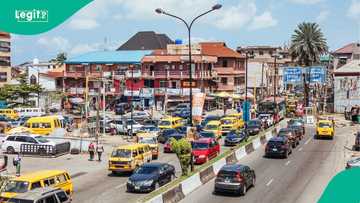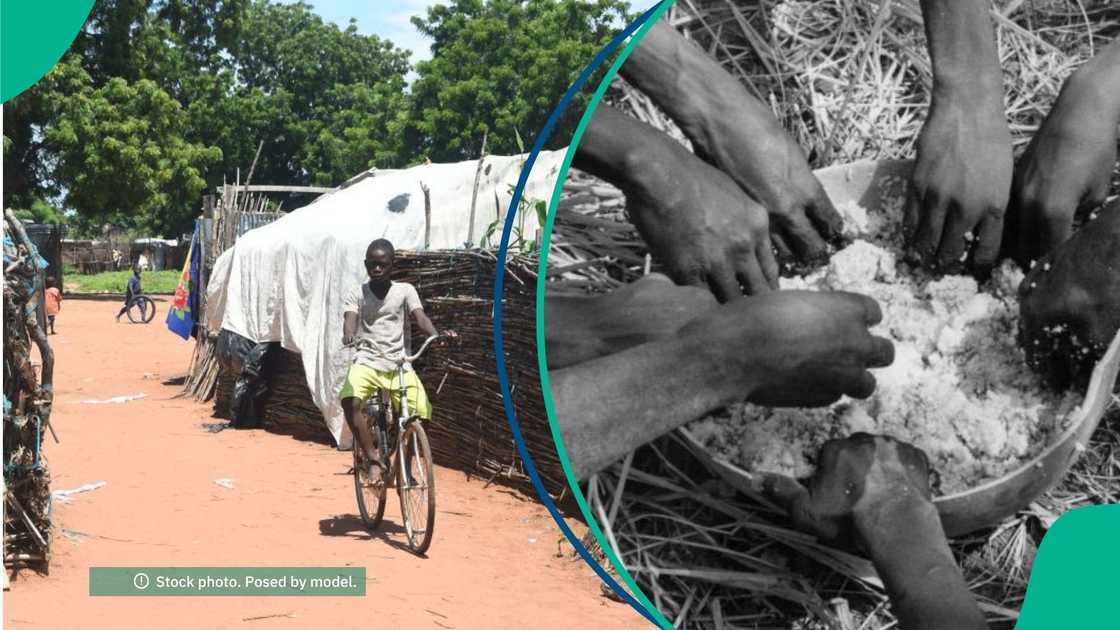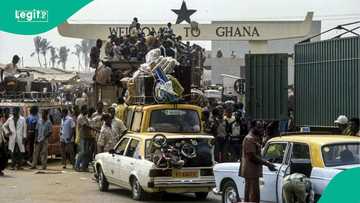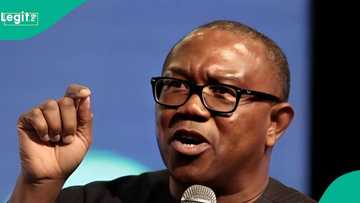The Untold Political Economy of Hunger in Nigeria, by Lekan Olayiwola
Editor’s note: In this piece, Lekan Olayiwola draws attention to how hunger in Nigeria is shaped by choices. The policy analyst shows how land deals, policy gaps, and export priorities are leaving millions without food or a voice.
There are maps that guide a country forward—geographic maps, electoral zones, trade corridors. Then there are maps that expose a nation’s failure. In Nigeria today, a new kind of map is forming, not on paper, but on stomachs: a hunger map, a civic cartography of abandonment and erasure.
According to the UN, over 31 million Nigerians face acute food insecurity in 2025, with more than 300,000 children at risk of dying from malnutrition. But these numbers conceal more than they reveal.

Source: Getty Images
Hunger in Nigeria is not merely a statistical or economic issue; it is a territorial indictment. It spreads along fault lines carved by violence, policy failure, and now, foreign exploitation.
Where the republic retreats, hunger lands
In the North-East, insurgency has collapsed local farming systems; food convoys are ambushed or blocked; markets are militarised or ghosted.
In the North-Central, communities like Benue and Plateau—once the nation’s food basket—are gutted by conflict and displacement, leaving granaries empty and farms fallow.
In the South-South, oil-rich but food-poor communities survive on overpriced, imported staples, while creeks once feeding fishing economies rot in spills.
Even in South-western Nigeria, farmers in Ogun and Oyo bypass local buyers entirely. One Lagos-based gari trader saw his supply chain collapse after the same farmers began selling to Chinese off-takers offering hard currency for cassava to hedge off inflation.
“They don’t want naira anymore,” he said.
“I can’t blame them, but now I can’t sell.”
Hunger here is not random. It is mapped by political neglect, violent disruption, and a global food economy that prizes foreign earnings over domestic nourishment.
Feeding others, starving ourselves
What’s unfolding in Nigeria is more than domestic policy failure; it is part of a broader, more insidious trend: global land capture and agricultural extraction.
In Jigawa State, over 12,000 hectares of fertile land were ceded to a Chinese-backed sugar firm under a multi-decade lease. Local farmers, unable to compete, now labour on what was once ancestral land, producing sugar not for Nigeria, but for export.
In Taraba, Dominion Farms (a U.S.-backed project under the G8’s New Alliance) displaced rice growers from 30,000 hectares of wetlands, redirecting harvests toward international supply chains.
In Cross River, Wilmar International cleared vast food-producing lands for palm oil plantations, leaving surrounding villages without cassava or maize.
Across Kano, Yobe, Katsina, and Borno, farmers increasingly export sorghum, maize, and millet to Ghana, Chad, and Cameroon, where CFA-franc payments outmatch domestic offers. Nigeria, in effect, exports nutrition and imports hunger.

Read also
Memory has no bus stop: Street renaming and the politics of presence in Lagos, by Lekan Olayiwola
This is not merely market logic. It is a lack of food justice, an unjust political economy that rewards foreign off-takers, punishes local wholesalers, and starves the republic in the name of trade balances.

Source: Getty Images
Hunger is not statistics, but a political weapon
Despite the scale of the crisis, Nigeria lacks a serious narrative infrastructure around hunger. No national address. No televised outrage. No policy coherence.
Instead, the elite celebrate export milestones and agricultural GDP growth, while over 30 million citizens fight hunger in silence.
This is civic abandonment. A republic that cannot feed its people has already broken its most basic promise.
Hunger is not a natural disaster. It is slow, bureaucratised violence. It accumulates where roads are impassable, where irrigation projects are abandoned, where floods strike without relief, and where no extension officer has visited in years.
Not just stomachs are emptied, but schools, clinics, and futures. The hungry cannot vote with dignity, organise with confidence, or imagine tomorrow. They are too tired to dream and too forgotten to matter.

Read also
Rethinking why “Nigeria must go” and the politics of grievance in Ghana, by Lekan Olayiwola
Much of this crisis is rooted in policy misalignment, where agricultural zones prioritise cash crops over staples, incentives reward foreign leaseholders, not local cooperatives, FX policy makes hard-currency exporters more attractive than local buyers, and trade reforms benefit global capital while ignoring hunger-prone neighbourhoods.
Policy without empathy is malnutrition by design. This is development by mass exclusion.
Not food security, Nigeria needs food sovereignty
Food security asks: Do people have access to food? Food sovereignty asks: Who controls the land, the seed, and the story? Distinguishing between the North-east’s insurgency-driven hunger and the South’s export-driven scarcity is also critical.
Nigeria must graduate from simply trying to fill bellies to reclaiming food governance. Without sovereignty over agricultural decisions—land use, pricing, supply chains—the republic remains exposed to global whims and elite capture.
To that end, we need to reform land tenure laws to prevent 99-year leases without community co-ownership; prioritise local food quotas before fulfilling foreign export contracts; guarantee naira-pegged local markets so that farmers have viable domestic alternatives to foreign off-takers; and protect farmers' rights to their seed, their land, and their price, so that food remains a national commons, not a global commodity.
A nation cannot be sovereign when its people go hungry while its land feeds others. Reclaiming the Republic means reclaiming local food production and distribution.
What does recovery look like? Community-based agriculture, not corporate leases; civic-driven distribution, not donor dependency, and agrarian justice, not export worship.
We must treat food as more than a basic need. It is a civic right, a democratic foundation, and a national security asset.
A republic that nourishes, flourishes
To solve hunger, we must stop treating it as background noise. It is not merely a humanitarian crisis. It is a political fracture. A republic that cannot nourish its people is not in distress; it is in denial.
We are not just witnessing food scarcity. We are witnessing the vanishing of a republic, field by field, plate by plate.
Feeding Nigeria is not charity. It is justice. It is sovereignty. It is the republic itself.

Read also
How Super Falcons' win exposes gendered failure in Nigeria’s broken institutions, by Lekan Olayiwola
Lekan Olayiwola is a public-facing peace & conflict researcher/policy analyst focused on leadership, ethics, governance, and political legitimacy in fragile states.
Disclaimer: The views and opinions expressed here are those of the author and do not necessarily reflect the official policy or position of Legit.ng.
Source: Legit.ng





